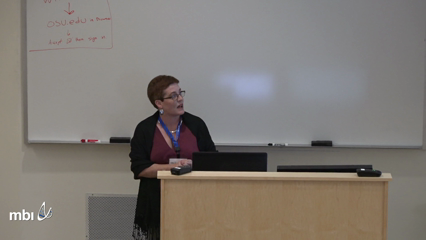MBI Videos
Kimberly Bussey
-
 Kimberly BusseyWhat is cancer? It is a fundamental question that still lacks an adequate answer. Cancers or cancer-like phenomena are found across the tree of life in multicellular organisms. The hallmarks of cancer describe the functions a cell or group of cells must express to become a cancerous tumor, including uncontrolled growth, uninhibited mobility, and resistance to cell death. The current paradigm ascribes the acquisition of such behavior to the gradual accumulation of genomic changes. This gene-centric view has been useful up to a point, but it suffers from the problem that most oncogenic changes are neither necessary, sufficient, nor context-independent. Furthermore, such behaviors can be suppressed in a physiologically normal environment.
Kimberly BusseyWhat is cancer? It is a fundamental question that still lacks an adequate answer. Cancers or cancer-like phenomena are found across the tree of life in multicellular organisms. The hallmarks of cancer describe the functions a cell or group of cells must express to become a cancerous tumor, including uncontrolled growth, uninhibited mobility, and resistance to cell death. The current paradigm ascribes the acquisition of such behavior to the gradual accumulation of genomic changes. This gene-centric view has been useful up to a point, but it suffers from the problem that most oncogenic changes are neither necessary, sufficient, nor context-independent. Furthermore, such behaviors can be suppressed in a physiologically normal environment.
We propose thinking about cancer as an atavism, in this case the re-expression of single-cell biology in a multicellular context. Cancer is the result of re-deploying single-cell biology in the context of cells that have evolved to be part of a multicellular organism. Under this context, we hypothesize that we can detect evidence of single-cell stress-responses, such as stress-induced mutation (SIM), in cancer genomes. Our work shows that there is evidence of SIM in cancer genomes which has clinical ramifications for both patient survival and treatment approaches.
